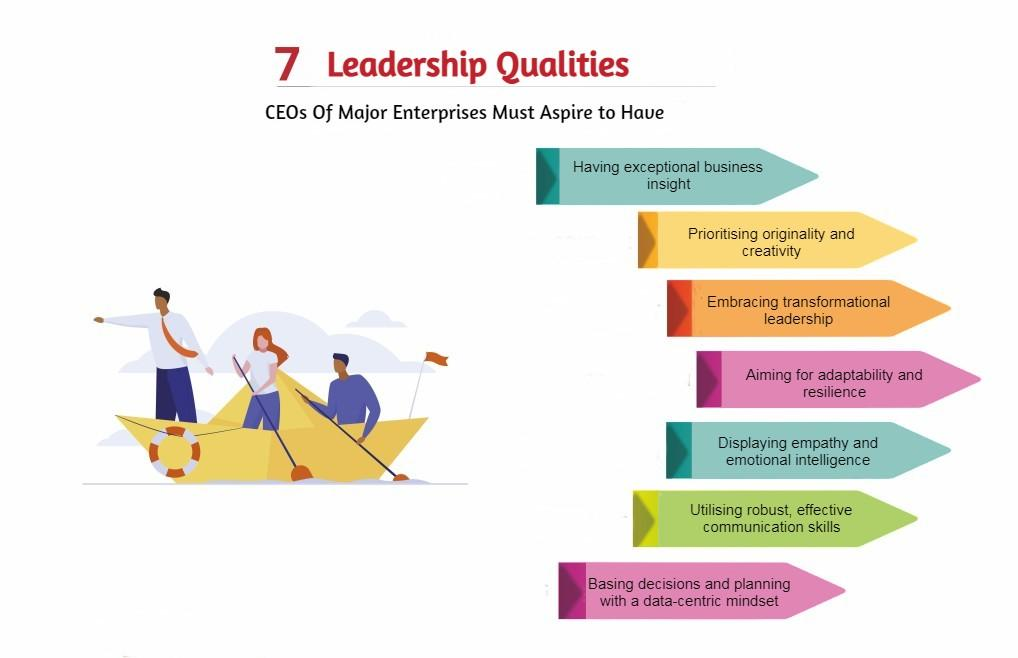When it comes to the best entrepreneurs, today’s CEOs are a different kind altogether. No longer consigned to just an executive role, modern-day CEOs relish the holistic nature of their responsibility.
Simply bringing in profitability is not enough. CEOs are expected to be top entrepreneurs who lead with a human-centric attitude, empathy, and a knack for driving innovation and cultural transformation. This is evident in how the best entrepreneurs in India and abroad operate today. Their adoption of transformational leadership principles and having an open, innovative, disruptive mindset is key to navigating the ever-changing business landscape successfully.
If you are a CEO of an organisation or aspire to become one in the future, then you must embrace the qualities that have come to define the best CEOs in the industry. In this blog, we will explore seven such leadership qualities.
7 Leadership Mantras for CEOs Aiming to Become the Best Entrepreneurs
- Having exceptional business insight: Business acumen is the ability to understand and navigate the inner workings of a business. This includes understanding financials, operations, and strategy. CEOs with strong business acumen can make informed decisions that drive their organization’s success. A study by Deloitte found that business acumen is one of the top five skills needed for CEOs to be successful.
Visionary leader Sanjiv Bajaj – the Chairman and Managing Director of Bajaj Finserv – comes to mind. As a pioneering fintech leader in the country, Sanjiv Bajaj has established one of the country’s most successful and trusted financial service providers by transforming the finance business at its core. His focus on innovating products that help bridge the country’s financial divide and make digital finance more accessible to all shows great insight into how one can turn industry and consumer pain points into sustainable opportunities. Not surprisingly, he also functions as the President of CII (2022-23) – an industry body that aims to create and sustain an environment conducive to the progress of India.
- Prioritising originality and creativity: Resourcefulness is finding creative solutions to problems and making the most of available resources. In today’s fast-paced business environment, resourcefulness is essential for CEOs to be able to adapt and stay competitive. Resourceful CEOs can find ways to achieve their goals even when faced with limited resources.
- Embracing transformational leadership: Transformational leadership is a leadership style that focuses on inspiring and motivating employees to achieve their full potential. Transformational leaders can create a vision for their organisation and inspire others to work towards that vision. They also empower employees to take ownership of their work and make decisions. According to a study by the Harvard Business Review, companies with transformational leaders have an average of 30% higher profitability and growth than those without.
A great example is that of Ratan Tata – the notable Chairman of the Tata Group. Thanks to his focus on human-centric leadership that seeks to encourage, inspire and motivate employees and teams, Ratan Tata has forged his legacy as one of the most famous Indian businessmen. He is known for interacting and mentoring many employees, enabling them to become the next leaders driving the Tata conglomerate forward.
- Aiming for adaptability and resilience: Adaptability and resilience are key traits for CEOs to have as they navigate a rapidly changing business landscape. Adaptable and resilient CEOs can pivot and change course when necessary and bounce back from setbacks. According to Harvard Business Review, companies that can adapt and recover quickly from disruptions have a higher likelihood of success.
- Displaying empathy and emotional intelligence: Emotional intelligence is the ability to understand and manage one’s own emotions and the emotions of others. Top businessmen and CEOs with high emotional intelligence can lead their teams effectively, build strong relationships, and create a positive work environment. A study by the Harvard Business Review, emotional intelligence is a critical skill for CEOs to have.
Anand Mahindra, the Chairman of the Mahindra Group, is known for his empathetic and emotionally intelligent personality, which is reflected in his leadership. He believes that empathy, and not bureaucracy, makes an organisation great. This is evident in how he interacts with his followers on social media. By treasuring every opinion, suggestion and idea one’s team shares and understanding how they work and how to get the best out of them, CEOs like Anand Mahindra successfully drive brand value immensely.
- Utilising robust, effective communication skills: Effective communication is essential for CEOs to convey their vision and strategy to their teams and stakeholders. CEOs with strong communication skills can clearly and effectively communicate their message, build trust, and inspire others. A study by the Harvard Business Review found that CEOs who communicate effectively are better able to lead their teams and achieve their goals.
- Basing decisions and planning with a data-centric mindset: A data-centric mindset is an ability to use data to inform decision-making. CEOs who have a data-centric mindset are able to analyse data to make informed decisions and understand their customers’ needs. According to a study by McKinsey, companies that use data to inform their decisions are more likely to be successful.
Conclusion
As we’ve seen, there are several essential leadership qualities that CEOs of major enterprises must possess. These include transformational leadership, business acumen, resourcefulness, adaptability and resilience, a data-centric mindset, emotional intelligence, and communication skills. By developing and honing these qualities, CEOs can lead their organisations to succeed in today’s fast-paced business landscape.
Of course, the key for you is to have patience. The best entrepreneurs and CEOs are those who understand this and never shy away from learning and making mistakes in the long run. Over time, these learnings will help you create a distinct, successful leadership personality that is sure to take you, your organisation and your teams to unprecedented heights! Developing these traits of your leadership personality will require a lot of time and effort.








